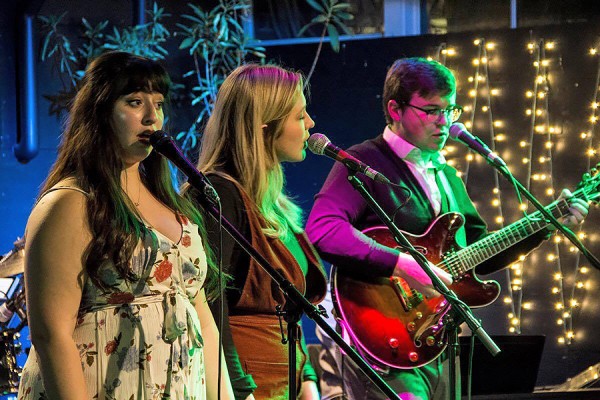 Technology helped music students complete their final examinations in performance despite the pandemic: Lilly Korkontzelos, Grace Gasparini, and Parker Schaefer.
Technology helped music students complete their final examinations in performance despite the pandemic: Lilly Korkontzelos, Grace Gasparini, and Parker Schaefer.
It began with three weeks left in the spring semester. Responding to government orders to stay at home, the University paused classes for one week and then restarted them online.
For music students and faculty at the School of Creative Arts (SoCA), it was a time of creativity, trying out new software and techniques, and sharing best practices.
Bachelor of Music students are required to take private lessons on their instruments with a SoCA special instructor as a requirement of this professional degree.
“We made the shift in about a week’s time,” says Jennifer Swanson, performance co-ordinator and a voice instructor in SoCA. “Many of music’s special instructors also have private studios and some may have had experience teaching online. They were comfortable with the technology. For others, it was totally new, but everyone jumped in and made things work.”
It was important to use platforms accessible to all students, so they used FaceTime, Skype and Zoom.
Students and their instructors decided on the repertoire assignments in January. They learn and perform a variety of repertoire and then home in on three or four pieces to perform for their final exams, known as a “jury.” Usually, these juries are performed live in the Performance Hall with a live accompanist and three in-person jurors. This year, this wasn’t possible.
“By mid-March my students were polishing their repertoire in preparation for juries,” says Dr. Swanson. “Students enjoyed continuing the one-on-one contact even though we had some connection problems.”
Each student recorded a video of their jury using pre-recorded accompaniment or Smart Music software. They then uploaded their best “take” to an unlisted YouTube channel and emailed the link to their instructor.
Students took a number of approaches to replacing their live accompanists — some employing iReal Pro, which allows the user to change key, tempo, and the feel of the arrangement; YouTube backing tracks, which don’t; and the Karaoke Version website.
Piano student Alex Aideira-Leite recorded tracks for singers, and guitarist Allesandro Rotondi, who graduated last week, recorded accompaniment for classmate Alanah Shield’s recording of God Only Knows.
Instead of having a combo of musicians backing up her graduation recital, singer Lilly Korkontzelos pivoted to using recorded accompaniment.
“I decided to make it light-hearted,” says Korkontzelos. “I created three separate videos all shot in our living room with my roommates as my off-screen audience.”
For the first video, which was her jazz segment, Korkontzelos walked on screen in a ball gown carrying her microphone as a prop and used iReal Pro accompaniment. On her acoustic set, she changed outfits and accompanied herself on keyboard. And for her final set of ballads, she sang Being Good isn’t Good Enough and Body and Soul to bossa nova piano accompaniment recorded by Aideira-Leite.
—Susan McKee
